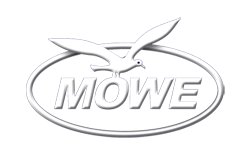Successful for over 60 years!
A tabular review
| 2023 | New Ownership of Möwe Teigwarenwerk GmbH with Mirko Bröcker, Retirement of Mr. Sengewisch |
| 2019 | Range extensions (whole grains, spelt and reduced carbohydrates) |
| 2018 | Acquisition of the HALAL certificate for the further expansion of supply relationships |
| 2017 | Expansion of supply relationships in Scandinavia (Finland, Sweden) |
| 2016 | Commissioning of an instant production plant |
| 2015 | Energy audit according to SpaEfV and continuous testing and improvement of energy efficiency |
| 2014 | Member of the Association for Controlled Alternative Animal Husbandry e.V. (KAT) Use of egg products according to the minimum standard for keeping ground (KAT certified) |
| 2012 | Möwe’s 60th anniversary Acquisition of our Kosher certificate Investment in further product specialisation for the processing industry |
| 2011 ff | Möwe assortment listings in food retail, focus on New Federal States |
| 2011 | Management Buy Out of Möwe Pasta Factory GmbH by Wolfgang Sengewisch changeover to exclusive use of egg products raised on barn standards |
| 2002 | Extension of the range of products for the processing industry and specialisation on baby food, whole grain and organic products |
| 2001 | Acquisition of shares by the Birkel pasta GmbH IFS and organic certification |
| 1999 | Management Buyout of the company by 3 Möwe managers |
| 1994 | Establishment of the CSM subsidiary MSC in Hamburg and their consequent takeover of sales and marketing activities |
| 1991- 1995 | Re-starting of operation with complete conversion to high temperature drying and introduction of the ISO 9001 quality assurance system |
| 1991 | Acquisition of the shares of the Treuhand trust by the Dutch CSM group based in Amsterdam |
| 1990 | Conversion from use of dried whole egg to liquid egg, founding of Möwe Pasta Factory GmbH, and formulation of the Möwe brand relaunch Investment in new packaging and weighing technology |
| 1987 | A high-temperature drying line for the production of spaghetti and macaroni with a capacity of 1400 kg / h |
| 1984 | Production of gluten-free pasta in Zwenkau |
| 1981 und 1982 | Absorption of Pasta plants in Zwenkau and Gadebusch into the Möwe organisation |
| 1968 | Construction of a production hall for the installation of four automated lines |
| 1956 | The trade mark “Möwe” and consecutive marketing of products under the logo and company name of the VEB Möwe Pasta Factory |
| 1952 | Founding of the VEB Mecklenburg Pasta Plant in Waren (Müritz) with the trademark “MeTeWa” – Mecklenburger Teigwarenwerk Waren (Mecklenburg pasta factory goods) |
